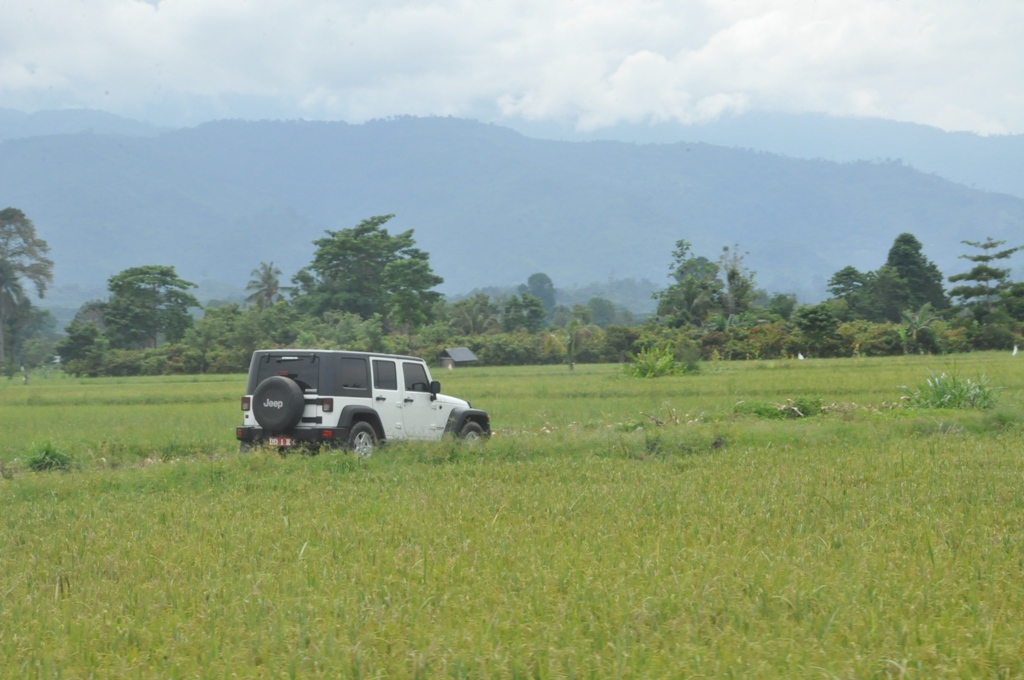Mining dominates East Luwu GDP but development of agriculture underpins equitable development
Wayan is a leader of the Balinese transmigrant community in Alam Buana village, East Luwu, South Sulawesi, home to the Sorowako Nickel Project. Since arriving from Bali in 1978 he claims to have witnessed ‘development’ in East Luwu. Before 2003, Wayan traversed muddy unsurfaced roads every morning from his home to his distant rice fields. During the rainy season, the road surface was even worse due to puddles and mud. This situation continued until the East Luwu government began constructing concrete roads in Alam Buana in that year. The surfaced road helps Wayan and other villagers to transport their crops to town. ‘It no longer took a whole day or two to go to the other village or city to sell our crops or buy our needs,’ he explained. Wayan strongly believes that regional development depends on the will of the leadership.
Mining and regional development in decentralised Indonesia
Giant nickel mining company PT Vale (formerly PT Inco Tbk) has operated in Sulawesi under a Contract of Work (CoW) since 1968. Through the Amendment and Renewal Agreement signed in 1996, the CoW has been amended and extended with validity periods until 2025. Following renegotiation of the CoW in 2014, as required by the 2009 mining law, PT Vale has reduced its mining area in Sulawesi to 118,435 hectares, whereas the original CoW had given them rights to explore over 6.6 million hectares.
The East Luwu district government and the the provincial and central governments have all depended on PT Vale for corporate royalties and non-tax revenues. Initially, the local government only received royalties on sand and gravel, with revenue from ore going to the central government. Since decentralisation, under Law 22/1999 on Regional Government and Law 25/1999, which deregulated finances and enabled local governments to directly raise revenue from mining, a much higher proportion of royalties flow straight to the district and provincial goverments. In fact, the district GDP (GRDP) for East Luwu reached Rp.21.2 billion in 2015. Mining and exacavation sectors remain the largest contributor of GRDP at 61.96 per cent.
Prior to implementation of regional autonomy, the influence of the company in its mining area was huge. The then district capital, Palopo, was far away. The company was left free to order the local environment to suit itself, as if it was the ‘new ruler’ in Sorowako. This has changed under regional autonomy. The new district government is close, and the revenues it receives are a significant part of its budget.
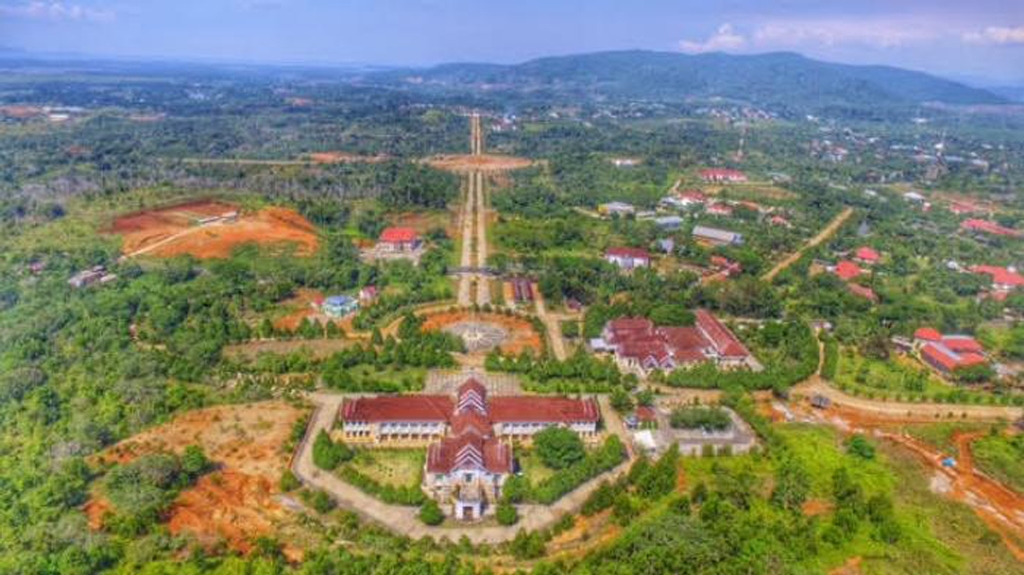
The new capital of East Luwu, Malili. (East Luwu Humas Pemkab)
Leadership for development
East Luwu in South Sulawesi was created as a result of the pemekaran (division) of North Luwu district in 2003. Based on 2015 data, the district area of 6944.98 square kilometres has a population of 275,595. Law No. 32/2004 concerning regional administration has provided an excellent opportunity for local government to demonstrate its ability to exercise the authority granted to it by regional autonomy.
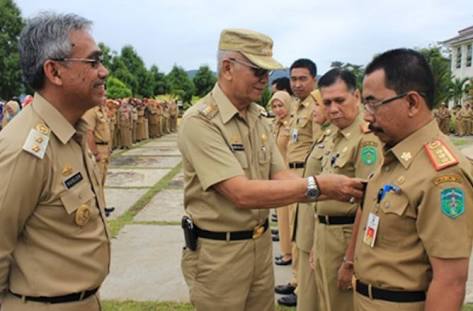
Andi Hatta Marakarma (left photo, middle), or AHM, was re-elected again in 2010 to head East Luwu, and was nominated by Tempo as one of 10 civil servants working "with heart". (East Luwu Humas Pemkab)
Regional leaders are responsible for determining regional policy and development. In East Luwu, this responsibility fell to Andi Hatta Marakarma, or AHM, as district head. AHM prepared the first election for the new district of East Luwu in the period of 2003–2005. He then served as the first district head of East Luwu from 2005 to 2010 and was re-elected to serve again during the period of 2010–2015. His task was complicated by the fact that East Luwu relies heavily on revenue from PT Vale in Sorowako, although this also means its GDP is amongst the highest in South Sulawesi.
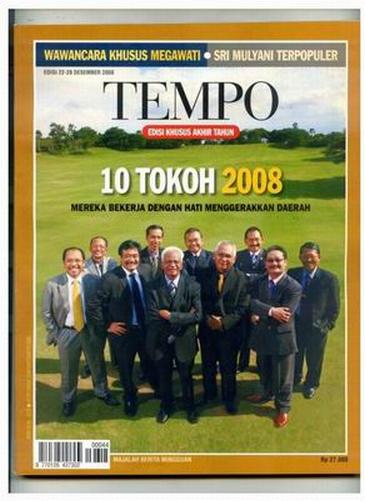
As a ‘son of the region’ (a member of the family of the customary ruler of the old kingdom of Luwu), AHM’s leadership was influenced by ‘local wisdom’, and he in turn supports local culture. He also has a background as a bureaucrat and Golkar party politician.
Equitable development
Although the mining project dominates local revenues, 74 per cent of East Luwu's population rely on agriculture for their livelihood. AHM explained, ‘The idea is simple. It’s all about equitable development.’ He refers to equitable development in terms of ‘edge’ and ‘centre’ through an analogy of ‘eating hot porridge’. In order to eat hot porridge one must take it slowly from the edge, not directly from the centre. When rural villagers can easily market their crops, the welfare of society as a whole can be improved.
As mandated by the 1945 constitution, the task of the government is to maintain regional economic development. This is defined as efforts and policies aimed at improving people’s living standards, enhancing regional economic relations and shifting economic activity from the primary sector to secondary and tertiary sectors.
‘Since PT Vale has operated in Sorowako, differences have emerged in the wellbeing of the population in the mining area compared to other surrounding villages in Luwu,’ AHM explained. While East Luwu comprises 11 sub-districts covering 127 villages, PT Vale’s community responsibility program covers only 4 sub-districts comprising 32 villages. Different levels of ‘development’ between villages can lead to social jealousy.
Although mining and quarrying provide up to 60 per cent of its GRDP, East Luwu has also excelled in the field of agriculture. AHM explains, ‘I always say, East Luwu was formed when God smiled. We have potential in the fields of cocoa production; we have succeeded in achieving sustainable production of rice. We used to have the issue of illegal logging, but nowadays, those forest squatters have begun to improve their lives by planting pepper.’
The community of East Luwu requires assistance to improve their welfare. During AHM’s term, the percentage of people classified as ‘poor’ in East Luwu (7.18 per cent in 2015) has slowly but steadily declined since 2006.
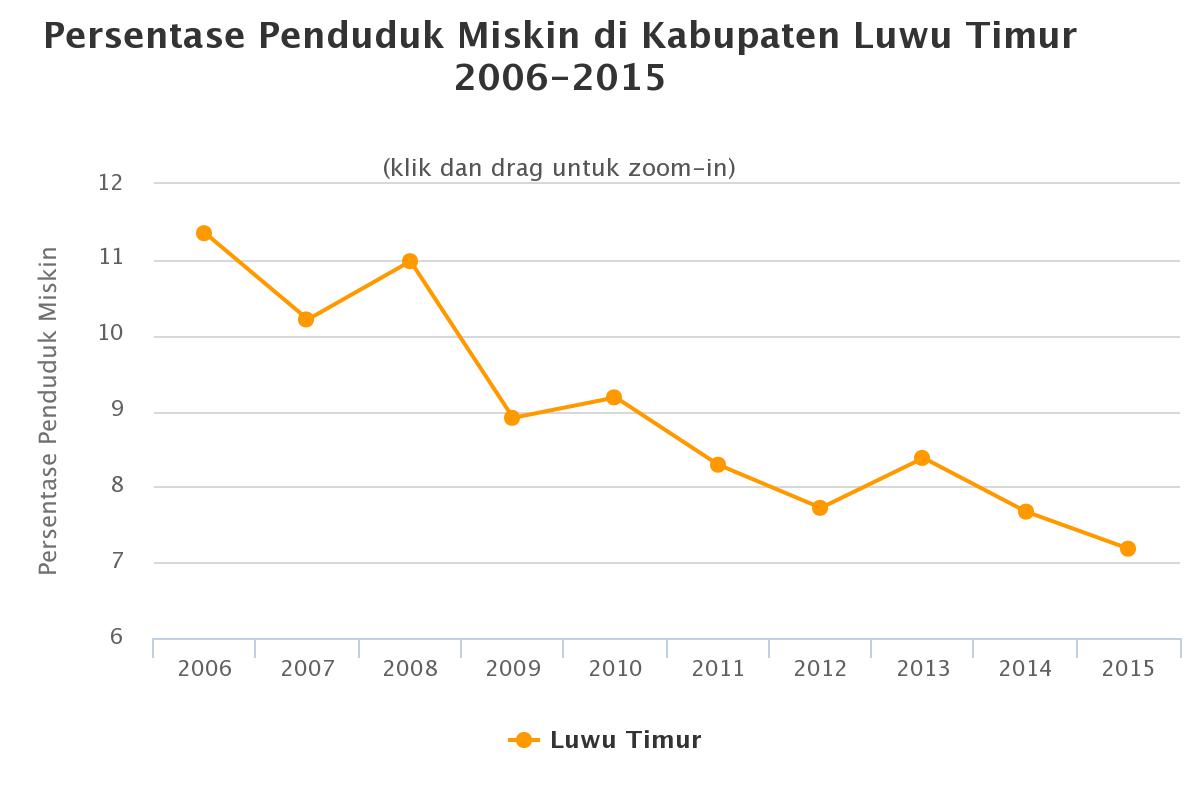
Andi Hatta Marakarma (left photo, middle), or AHM, was re-elected again in 2010 to head East Luwu, and was nominated by Tempo as one of 10 civil servants working "with heart". (East Luwu Humas Pemkab)
Percentage of the East Luwu population classified as living in poverty. (East Luwu Central Statistics Agency)
While urban development is commonly the primary concern of leaders, AHM focuses on rural development. As a result, he endures criticism from those living in the capital of East Luwu, even his own close relatives. ‘People may say I am a dictatorial leader. I don’t blame them. I am very confident in every decision that I take because personal interest does not influence my decision making. It is purely for the goal of development.’
AHM declares that in spite of some development gains, much work has remained unfinished. Infrastructure in particular remains very limited. He has advised for regional government budget (APBD) spending to be kept to less than 40 per cent for bureaucratic salaries and 60 per cent for public expenditure in order to achieve growth. AHM’s recognition that nepotism and corruption pose challenges to development causes him to review work directly on site rather than to rely on reports from others.
That the situation in East Luwu is significantly influenced by the presence of PT Vale requires greater attention by the company, according to AHM. ‘PT Vale’s management appears to be absorbed by problems that need to be dealt with quickly rather than by long-term planning for local development. In spite of the delineated timeframe of a CoW, opportunities still exist for longer-term development planning.
‘For example, many communities are developing pepper gardens on land within the mining company’s concession area. What do they do to secure their concession area? What steps do they take to prevent people using land within the concession? However, the company must also consider the future social impact of their operations and not just restrict their concern to corporate affairs.’
AHM likens the company’s short-term planning to firefighting. ‘This company will be here for their CoW, but the community will stay for a lifetime. So every problem should be resolved, not just given a temporary solution.’
Limits of macro-economic focus
It is the policy paradigm at the local government level that is driving regional economic growth. Local government is focused on macro-economic gains, particularly the growth and improvement of the district budget. This focus on growing the budget is not enough to guarantee the welfare of the people in the region. Good social and economic planning is also required. AHM’s efforts as the head of the East Luwu government to use mining revenues to benefit people all over the district, including outside the mining concession area, and open up the economic opportunities of the rural population might prove successful. Through such efforts, the standard of living and prosperity of farmers like Wayan may improve.
Sulviyani Suardi (sulvi.suardi@gmail.com) is a postgraduate scholar at the Institute of Governance Studies (IPDN) in Jakarta.

